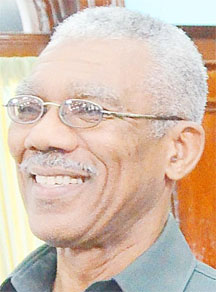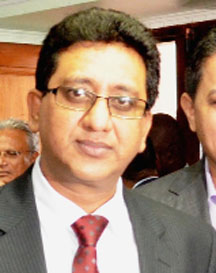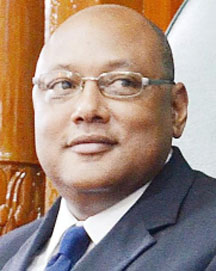Opposition leader David Granger is asking the High Court to dismiss the motion by Attorney General Anil Nandlall to overturn Speaker Raphael Trotman’s ruling on limiting the participation of Home Affairs Minister Clement Rohee in the National Assembly.
Granger moved to the court on Wednesday, saying that the orders being sought by Nandlall are without merit and that the court has no authority to inquire into internal proceedings of the National Assembly, where there has been no constitutional breach. As a result, he said that Nandlall’s motion is an abuse of the process of the court and is violative of the doctrine of the separation of powers.
The case is scheduled to be heard before the acting Chief Justice Ian Chang on Friday.
According to a summons, prepared and filed by Senior Counsel Rex Mc Kay and attorney Basil Williams, Granger is seeking an order that the Originating Notice of Motion, filed by Nandlall in November, be struck out and dismissed as well as an order staying all proceedings until the hearing and determination of the summons.
On November 27, government through Nandlall moved to the court to overturn Trotman’s decision, made five days before. Trotman’s ruling in effect limits the minister’s participation in the House, pending the findings of the Committee of Privileges on the enforceability of a motion in the name of Granger seeking to have Rohee gagged in the National Assembly.

Granger and Trotman were named as respondents in that matter, with Nandlall asking the court for a declaration that the Speaker’s decision was “unlawful.” He has also asked for a declaration that the Privileges Committee has no jurisdiction to deal with or determine any issue remitted to it by virtue of Trotman’s ruling. In addition, he is seeking orders setting aside the ruling and any decision and/or ruling of the Privileges Committee arising from it as well as one directing Trotman to permit Rohee to perform his duties in the National Assembly as an elected-member and a duly appointed Minister of Government.
In the Affidavit in Support of Summons, Granger said that he was advised that the declarations and orders being sought “are without merit and are misconceived.” He further said he was advised that the Speaker’s decision was done during the course of his presiding at a sitting of the National Assembly pursuant to the provisions of the Standing Orders and was an internal proceeding of the National Assembly.

“That I am further advised by my Counsel as aforesaid and verily believe that the court has no jurisdiction to inquire into the validity of internal proceedings of the National Assembly where there has been no breach of the constitution,” he said, while contending that Nandlall’s action is legally misconceived as the supporting affidavit contains no allegation of fact capable of supporting a finding of constitutional breach by any of the respondents or the National Assembly.
He added that the irregularities alleged by Nandlall are a matter for Parliament, not the courts.
Granger further said he was advised that Trotman’s ruling is not of itself unlawful.
He explained that his motion only seeks to prevent the minister from speaking in the National Assembly so long as he is purporting to carry out his ministerial functions.

Rohee, he noted, is free to speak in the National Assembly in any other capacity.
He also pointed out that no parliamentarian has a constitutional right to speak during debates as their right to do so is governed by the Standing Orders.
As a result, he emphasised that Rohee has not been silenced completely but rather is only limited as a result of Resolution No. 18 of 2012 of the National Assembly expressing no confidence in him as Minister of Home Affairs.
The Committee of Privileges, Granger added, was established by the Standing Orders, not the constitution and the determination of its powers and jurisdiction is an internal matter for the National Assembly, not the courts.




